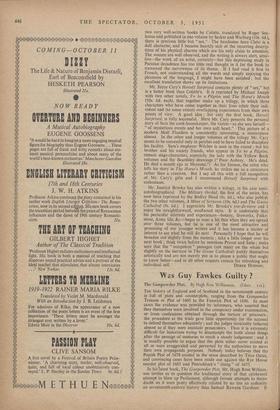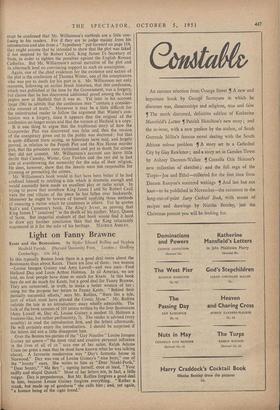Was Guy Fawkes Guilty ?
The Gunpowder Plot, By Hugh Ross Williamson. (Faber. 2 s.)
THE history of England and of Scotland in the seventeenth century is full of plots and counterplots, ranging from the Gunpowder Treason or Plot of 1605 to the Fenwick Plot of 1696. In most cases the evidence was provided by informers, who asserted that they themselves were involved in the conspiracy under examination, or from confessions obtained through the torture of prisoners ; the procedure at the trials gave little opportunity for the accused to defend themselves adequately ; and the judges invariably behaved almost as if they were assistant prosecutors. Thus it is extremely difficult for historians trying to disentangle the truth about things after the passage of centuries to reach a steady judgement ; and it is usually possible to argue that the plots either never existed at all or were exaggerated and perverted by the authorities to serve their own propaganda purposes. Nobody today believes that the Popish Plot of 1678 existed in the sense described by Titus Oates, and convincing cases have been made out against the Rye House murder plot of 1683 and Penruddock's " rising " of 1655.
In hislatest book, The Gunpowder Plot, Mr. Hugh Ross William- son invites us to question the traditional story of that celebrated attempt to blow up Parliament, although former attempts to throw doubt on it were pretty effectively refuted by no less an authority on seventeenth-century history than Samuel Rawson Gardiner. It
must be confessed that Mr. Williamson's methods are a little con- fusing to his readers. For if they are to judge mainly from his introduction and also from a " hypothesis " put forward on page 114, they might assume that he intended to show tbat the plot was faked if not inspired by Sir Robert Cecil, King James l's Secretary of State, in order to tighten the penalties against the English Roman Catholics. But Mr. Williamson's actual narrative of the plot and its aftermath lend no convincing support to such an assumption.
Again, one of the chief evidences for the existence and nature of the plot is the confession of Thomas Winter, one of the conspirators who was put to death for his part in it. Mr. Williamson not only reasserts, following an earlier Jesuit historian, that this confession, which was published at the time by the Government, was a forgery, but claims that he has discovered additional proof among the Cecil papers now at Hatfield that it was so. Yet later in his account (page 196) he admits that the confession may "contain a consider- able amount of truth." Moreover it may be a little difficult for the uninstructed reader to follow the argument that Winter's con- fession was a forgery, since it appears that the original of the confession no longer exists.and that the version at Hatfield is a copy.
It • is one thing to argue that the traditional, story of how the Gunpowder Plot was discovered was false and that the version of the conspiracy given out to the public was doctored ; but that is quite different from saying, as historians have said, and largely proved, in relation to the Popish Plot and the Rye House murder plot, that the prisoners were victimised and put to death for crimes they did not commit. Mr. Williamson's account can leave little doubt that Catesby, Winter, Guy Fawkes and the rest did in fact aim at overthrowing the monarchy for the sake of their religion. He does, however, show that the Jesuits were not responsible for planning or promoting the crimes. Mr. Williamson's book would in fact have been better if he had confined himself to retelling a tale which is dramatic enough and would assuredly have made an excellent play or radio script. In trying to prove that somehow King James I and Sir Robert Cecil were the real villains of the piece he has fallen over backwards. Moreover he ought to beware of himself applying those methods of smearing a victim which he condemns in others. For he quotes Rait's and Cameron's book, The King's Secret, as proving that King James I " connived " in the death of his mother, Mary, Queen of Scots. But impartial students of that book would find it hard to draw any harsher conclusion than that the King reluctantly acquiesced in it for the sake of his heritage. MAURICE ASHLEY.






















































 Previous page
Previous page